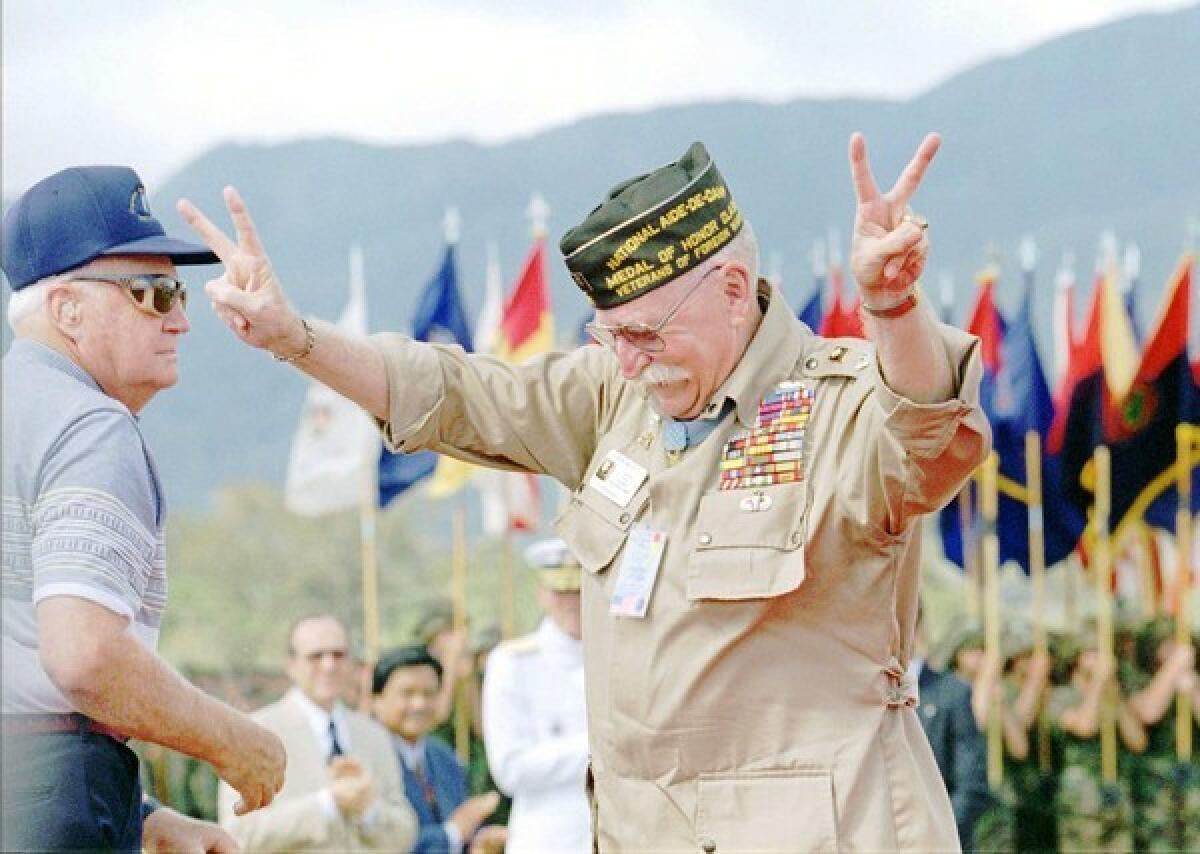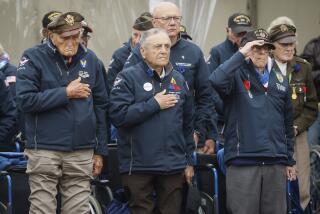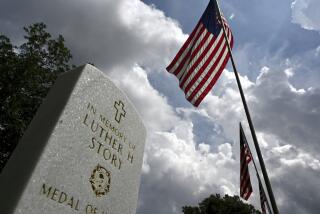Lewis Millett dies at 88; veteran of three wars was the recipient of the Medal of Honor

Lewis L. Millett, a retired Army colonel and veteran of three wars who received a Medal of Honor for leading a bayonet charge up a heavily defended hill during the Korean War, has died. He was 88.
Millett, a resident of Idyllwild, who had various health problems in recent years, died Saturday at Jerry L. Pettis Memorial VA Medical Center in Loma Linda, said his son, Lee.
In a 31-year career in the Army that included service in World War II, Korea and Vietnam, Millett received numerous awards, including the Distinguished Service Cross, the Silver Star, two Legions of Merit, three Bronze Stars, four Purple Hearts and three Air Medals.
“The man was born 170 years probably too late for his liking; there is zero question in my mind he would have been one of the original Sons of Liberty,” said Mike Goldware, who was chairman of the committee that built the National Medal of Honor Memorial at Riverside National Cemetery in 1999.
“He had an unequivocal love of country,” Goldware said.
As the keynote speaker at the dedication of the Riverside Veterans’ Monument in 1995, Millett told the crowd: “If you believe in freedom, you’ve got to serve.”
He was captain of E Company, 2nd Battalion of the 25th Infantry Division’s 27th Infantry Regiment in Korea on Feb. 7, 1951, when he demonstrated what his Medal of Honor citation described as “superb leadership, conspicuous courage and consummate devotion to duty.”
Millett and his men were patrolling in the vicinity of Soam-Ni when they encountered enemy troops along a ridge known as Hill 180.
After one of his platoons was pinned down by small-arms, automatic and antitank fire, Millett ordered his men to fix bayonets.
He then led an assault up the hill, where, according to his citation, he “bayoneted two enemy soldiers and boldly continued on, throwing grenades, clubbing and bayoneting the enemy, while urging his men forward by shouting encouragement.”
Despite heavy enemy fire, the fierce hand-to-hand assault continued to the top of the hill.
Millett’s “dauntless leadership and personal courage so inspired his men that they stormed the hostile position and used their bayonets with such lethal effect that the enemy fled in wild disorder,” the citation said.
Although Millett was wounded by grenade fragments, he refused to be evacuated until the hill was taken and secured.
Historian S.L.A. Marshall later described the Millett-led assault up Hill 180 as “the most complete bayonet charge by American troops since Cold Harbor,” an 1864 Civil War battle.
Born Dec. 15, 1920, in Mechanic Falls, Maine, Millett grew up in Massachusetts, where he joined the state National Guard in 1938.
In 1940, with the war in Europe underway, he enlisted in the Army Air Corps.
But after President Franklin D. Roosevelt said in a 1941 speech that no Americans would fight on foreign soil, Millett deserted the Army and joined the Canadian Army.
He wanted to fight.
By the time he arrived in England with the Canadian Army in 1942, the United States was in the war, and he was allowed to transfer back to the U.S. Army.
As a member of the 27th Armored Field Artillery of the 1st Armored Division, Millett participated in the Allied invasion of North Africa, where he earned a Silver Star after driving a burning halftrack loaded with ammunition away from U.S. troops and jumping out just before it exploded.
Millett had been in combat for a year and was fighting in Italy when the Army finally confronted his military record and he was told that he had been found guilty of desertion, fined $52 and sentenced to 30 days hard labor.
“But I was a sergeant and didn’t have to do the hard time,” he said in an interview with historynet.com.
“Then a few weeks later, they made me a second lieutenant!” he said.
“I must be the only Regular Army colonel who has ever been court-martialed and convicted of desertion.”
Back home after the war ended in 1945, Millett joined the Maine National Guard.
He was attending Bates College in Lewiston, Maine, when the Army called for volunteers to return to active duty in 1949.
After serving in Korea and Vietnam, he retired in 1973.
Millett’s son Army Staff Sgt. John Millett was among the soldiers killed in the 1985 crash of a jetliner in Gander, Newfoundland, while returning from peacekeeping duty in the Sinai Peninsula.
In addition to his son Lee, Millett is survived by his other children, Tim and Elizabeth; a brother, Albert; three sisters, Ellen Larrabee, Jean Pepin and Marion Finnity; and four grandchildren.
A funeral service will be held at 10 a.m. Dec. 5 at Riverside National Cemetery.
More to Read
Start your day right
Sign up for Essential California for the L.A. Times biggest news, features and recommendations in your inbox six days a week.
You may occasionally receive promotional content from the Los Angeles Times.






